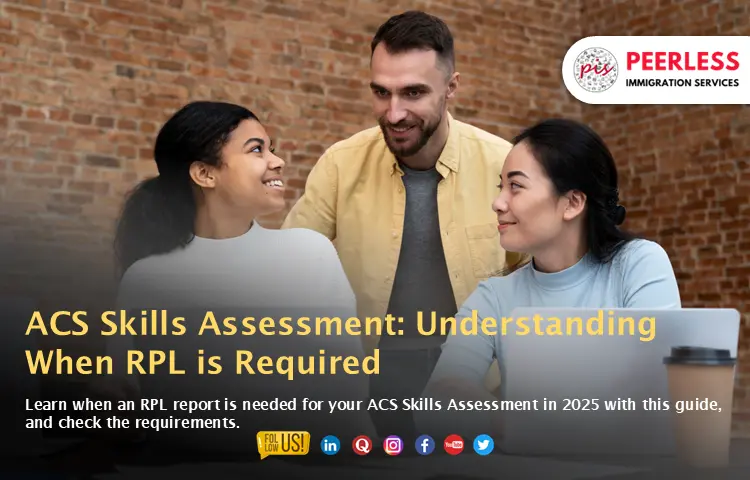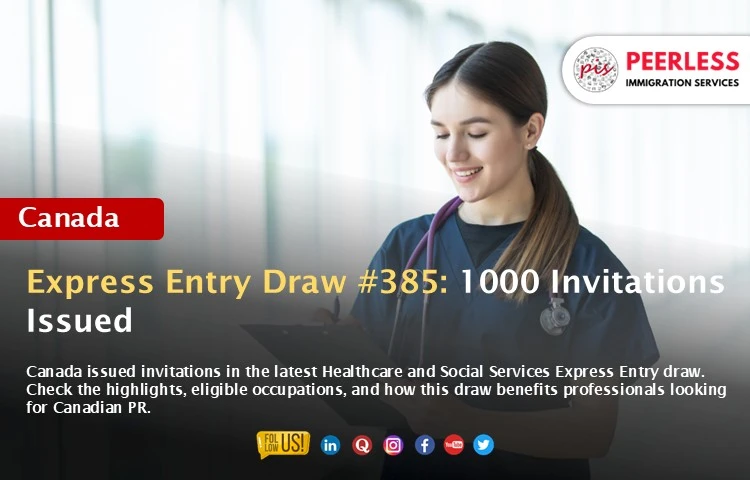
ACS Skills Assessment: Understanding When RPL is Required
The Australian Computer Society (ACS) Skills Assessment is a one of the primary steps for Information and Communication Technology (ICT) professionals planning to migrate Australia under general skilled migration pathways, including Skilled Independent Visa (subclass 189), Skilled Nominated Visa (subclass 190), or Skilled Work Regional Visa (subclass 491).
For many applicants, a key question arises: Do I need a Recognition of Prior Learning (RPL) report for my ACS Skills Assessment?
In this article, we provide a detailed and up-to-date guide to help you determine whether an RPL report is necessary for your situation. If it is, we also explain the requirements involved and how Peerless Immigration Services can assist you in navigating this complex process.
What is the ACS Skills Assessment?
The ACS (Australian Computer Society) is the designated assessing authority for ICT occupations in Australia. It is responsible for evaluating the qualifications and work experience of professionals to ensure they meet the requirements for employment in the Australian ICT sector.
The assessment is the first step for many skilled migration visas, confirming that an applicant’s skills align with the Australian and New Zealand Standard Classification of Occupations (ANZSCO) code for their nominated occupation, such as Software Engineer, IT Project Manager, or Network Administrator.
ACS offers several assessment pathways, including General Skills, Temporary Graduate, Post-Australian Study, and Recognition of Prior Learning (RPL). The appropriate pathway depends on your educational background, work experience, and the specific requirements of your nominated occupation.
What is an RPL Report?
The Recognition of Prior Learning (RPL) report is a special document created for ICT professionals who do not have formal ICT qualifications or whose qualifications do not fully meet ACS standards. The RPL pathway allows these professionals to show the skills and knowledge they have gained through work experience, non-formal training, or self-learning, matching them with the abilities needed for their chosen ANZSCO occupation.
The RPL report consists of two main sections:
- Key Areas of Knowledge (KAoK): Applicants must demonstrate their expertise in specific ICT domains, as outlined in the ACS Core Body of Knowledge for ICT Professionals (CBOK). This section should explain how the applicant acquired these skills through hands-on experience.
- Project Reports: Applicants are required to submit two project reports—one for a project completed within the last three years, and another for a project completed within the last five years. These reports should clearly describe the applicant’s role, responsibilities, the tools and technologies used, and the outcomes of each project, showcasing their ICT capabilities.
Do You Need an RPL Report for ACS Skills Assessment?
Whether you need an RPL report depends on your educational qualifications and work experience. Below are the scenarios where an RPL report is required or not required, based on the latest ACS guidelines as of 2025:
When You Need an RPL Report
You must submit an RPL report if:
- You lack formal ICT qualifications: If you do not have a higher education (e.g., a bachelor’s degree, diploma, or higher) in an ICT-related field, you need to demonstrate eight years of relevant work experience in an ICT role aligned with your nominated ANZSCO code. The RPL report serves as evidence of your skills and knowledge.
- Your qualifications have insufficient ICT content: If you hold a tertiary qualification (e.g., AQF Diploma or higher) that is not in ICT or contains insufficient ICT content (less than 33% ICT-related for a bachelor’s degree or 50% for a diploma), you need six years of relevant work experience and an RPL report to prove your competency.
- Your qualifications are not recognized: If your degree or diploma is not comparable to Australian standards or lacks sufficient ICT relevance, the RPL pathway allows you to showcase your practical experience to meet ACS requirements.
When You Do NOT Need an RPL Report
You may not need an RPL report if:
- You have an ICT major qualification: If you hold a bachelor’s degree or higher with at least 33% ICT content (or 50% for a diploma) closely related to your nominated ANZSCO occupation, you can apply through the General Skills pathway. Typically, two years of relevant work experience in the past 10 years or four years anytime in the past is required.
- You are a recent Australian ICT graduate: If you have completed an ICT-related bachelor’s, master’s, or doctoral degree from an Australian institution within the last six months, you can apply through the Temporary Graduate pathway, requiring only one year of relevant work experience or completion of the ACS Professional Year program.
- You have an ICT minor qualification: If your qualification has at least two-thirds of the ICT content required for a major, you can apply under the General Skills pathway with five to six years of relevant work experience, depending on the timing of your experience.
- If you initially apply under the General Skills pathway and your qualification is deemed to have insufficient ICT content, ACS may recommend switching to the RPL pathway. This incurs an additional fee.
- Work experience must be full-time (at least 20 hours per week) and paid. Part-time work or experience gained as part of a qualification (e.g., internships during study) is not counted.
What are the requirements for the ACS RPL?
To successfully apply through the RPL pathway, you must meet the following requirements:
Work Experience:
- Non-ICT qualification holders: Six years of relevant ICT work experience.
- No tertiary qualifications: Eight years of relevant ICT work experience, with the additional two years not necessarily related to the ANZSCO code.
- Project Reports: Submit two detailed project reports within the ACS RPL Form. One project must have been completed within the last three years, and the other within the last five years. Each report should include:
- Project objectives and scope.
- Your specific role and responsibilities.
- Tools, technologies, and methodologies used (e.g., programming languages, system analysis, database management).
- Project outcomes and your contributions.
- Key Areas of Knowledge: Address as many relevant areas from the ACS CBOK as possible, such as network topology, quality assurance, system design, or ICT management.
- Evidence: Provide supporting documents, such as employment reference letters (on company letterhead, detailing dates, roles, and responsibilities), payslips, and optionally, vendor certifications (e.g., Cisco, Microsoft) to demonstrate current knowledge.
- Originality: The RPL report must be plagiarism-free, as ACS uses tools like TURNITIN to check for originality. Plagiarism can lead to rejection and a potential 12-month ban from reapplying.
- Application Fee: The RPL assessment fee is AUD 605, payable at the start of the application. Additional fees may apply for extra employment or qualification episodes (AUD 50 each) or pathway changes (AUD 200).
With a proven track record of helping ICT professionals achieve positive ACS assessments, Peerless Immigration Services combines expertise, attention to detail, and a client-centric approach to maximize your chances of success. Their services are particularly valuable for applicants with non-ICT qualifications or complex work histories, ensuring that your RPL report stands out in a competitive migration landscape.
Tips for a Successful RPL Application
- Understand ACS Guidelines: Thoroughly review the ACS Skills Assessment Guidelines and RPL Instruction Guide (updated 2023) to ensure compliance.
- Choose Relevant Projects: Select projects that clearly demonstrate your ICT skills and align with your nominated occupation.
- Be Detailed and Specific: Provide concrete examples of your contributions, such as specific programming languages used or system design methodologies applied.
- Seek Professional Help: Engage experts like Peerless Immigration Services to avoid common pitfalls and enhance your application’s quality.
- Monitor Application Progress: Use your ACS reference number to track your application status online and respond promptly to any requests for additional information.
Processing Time of ACS
The ACS Skills Assessment typically takes 4–10 weeks, depending on the completeness of your application. Priority requests (for visa deadlines within 12 weeks) may be processed in two weeks if supported by evidence like a visa grant letter. A “Suitable” outcome confirms your eligibility for skilled migration, while a “Not Yet Suitable” result may require additional experience or education. Applicants can request a review or appeal if they disagree with the outcome, supported by additional evidence.
How Peerless Immigration Services Can Help
Getting through the ACS Skills Assessment and preparing an RPL report can feel overwhelming, especially because even small mistakes can lead to rejection. Peerless Immigration Services, a trusted expert in Australian immigration, is here to help you every step of the way. Here's how we can support you:
- Personalized Eligibility Assessment: We will evaluate your profile to determine whether you need an RPL report or qualify for another ACS pathway, ensuring you choose the correct application type from the start.
- Expert RPL Report Writing: Our team of professional writers, well-versed in ACS guidelines, crafts high-quality, plagiarism-free RPL reports tailored to your specific ANZSCO code. We ensure that your Key Areas of Knowledge and project reports effectively showcase your skills and align with Australian standards.
- Document Preparation and Review: We assist in compiling and verifying all required documents, including employment references, payslips, and educational certificates, ensuring they meet ACS requirements (e.g., high-quality scans at 300 dpi, certified translations if needed).
- Project Selection Guidance: We help you select appropriate projects for your RPL report, ensuring they are recent (within the last three and five years) and demonstrate relevant ICT competencies.
- Plagiarism Checks: We use advanced tools to ensure your RPL report is original, reducing the risk of rejection due to plagiarism.
- Application Submission Support: We guide you through the ACS online application process, ensuring all forms are completed accurately and submitted on time.
- Post-Submission Assistance: If ACS requests additional documents or recommends a pathway change, we provide ongoing support to address feedback and finalize your application.
- Visa Application Guidance: Beyond the ACS assessment, we offer comprehensive support for the next steps, such as preparing your Expression of Interest (EOI), assisting you in obtaining a Police Clearance Certificate (PCC), and meeting visa-specific requirements like English proficiency tests (e.g., IELTS, TOEFL).
If you lack formal ICT qualifications or have insufficient ICT content in your degree, the RPL pathway is essential to demonstrate your skills through practical experience. By adhering to ACS guidelines and crafting a well-prepared RPL report, you can significantly enhance your chances of a positive assessment and a successful migration journey.
We at Peerless Immigration Services offers end-to-end support, from eligibility assessment to professional RPL report writing and visa application guidance. Our expertise ensures that your application is accurate, compliant, and compelling, paving the way for a smooth transition to a rewarding career in Australia’s thriving ICT sector.
Connect with our immigration experts to take the first step toward your Australian migration.















